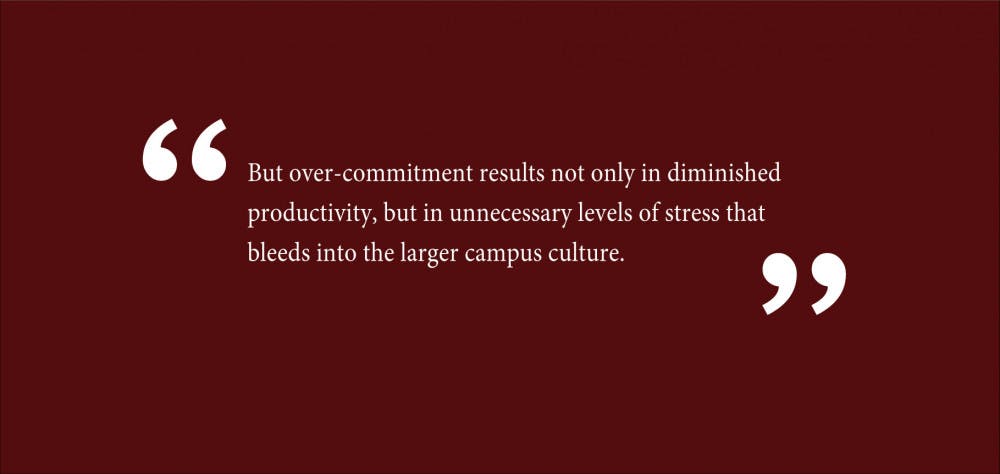Brown students try to do it all, and maybe they should be doing less. Upon entering Brown, it is easy to get pulled into the hegemonic standard of student involvement on campus. One has to merely step foot in the club fair during the first weeks of the semester to get a sense of how involved Brown students really are. The Main Green is packed with rows of tables with various club members shouting over each other, hoping to draw in eager first-years. The daunting environment conveys a clear message to new students — that we can and should be signing up for everything.
This reflex toward over-commitment is unhealthy. Certainly, the near unanimity of student extracurricular involvement on this campus makes Brown special by cultivating an enterprising and interdisciplinary mindset. But students should be more selective in choosing what clubs to join, what research positions and campus jobs to apply for or even how many classes to take. It is impossible to do it all and do it well — all too often, students spread themselves thin by over-involving themselves to the point where they are not able to complete their assignments or attend meetings for their extracurricular clubs and organizations. Ultimately, the quality of our involvement is far more important than the quantity of organizations we are involved in during our time at Brown. Not only will students have far more meaningful experiences and personal connections if they channel their energy and time to fewer activities, but the campus organizations themselves will see better development if students are able to be more dedicated with their time.
This is something I have found is a common sentiment for people in leadership positions across the board at Brown. In speaking to Sara Kutscher ’20, president of Spoon University, she expressed frustration that her club members have continuously neglected to treat their commitments as priorities. “I always find it very frustrating that every year we get a slew of applications for our club, all of which seem super engaged and ready to be a committed member that year,” she said. “But the same trend frequently occurs in which these new members are so over-committed with activities that someone always has a conflict with a meeting time or helping with an event.”
Students usually have the best intentions when they first sign up for these obligations. Perhaps it from Brown’s pure liberal arts backbone, which encourages undergrads to touch and explore every facet of academia and creative pursuit. But this sentiment also cultivates a culture in which students individually feel the need to commit to as much as they can, perhaps to be an example for the impressive diversity of student involvement and interests on Brown’s campus. Ultimately, there is a difference between engaging and exploring a diverse array of activities and committing to as much as possible. Exploration, particularly during the first half of college, helps us figure out what we are most interested in and what we may ultimately want to do with our lives post-graduation. But over-commitment results not only in diminished productivity, but in unnecessary levels of stress that bleed into the larger campus culture.
Further, this “do it all — and more” ethic can alienate students who have truly steadfast commitments to on-campus jobs. For those who have to spend a fixed number of hours working for pay, added pressure to join a long list of extracurricular clubs can make them feel like they are unable to fully participate in Brown’s culture.
To that end, I think we must re-examine what it means to be successful at Brown. Not only is it impossible to do it all and do it well, but it is also impossible to do it all without unhealthy levels of stress. Brown may be known as one of the happiest colleges, but it has also been ranked in the top ten most stressful universities in the United States.
We have an ability at Brown to truly craft our college experiences — both in academics and extracurriculars — that is uncommon to many universities. In choosing how to get the most out of our time here, be that how we contribute to ourselves or to the University, we need to be more thoughtful and selective in what we choose to do. We can’t do it all, and coming to terms as individuals with this will hopefully alleviate the pressure we all feel to commit to everything.
Anna B. Kramer ’20 can be reached at anna_kramer@brown.edu. Please send responses to this opinion to letters@browndailyherald.com and op-eds to opinions@browndailyherald.com.





